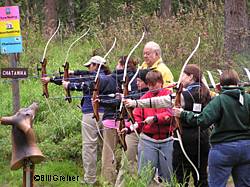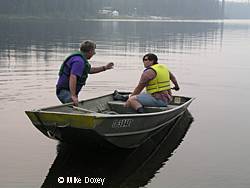Alaska Fish & Wildlife News
May 2006
Becoming an Outdoors-Woman

The History
Why do fewer women than men participate in outdoor activities such as hunting, fishing, and camping?
This question was being tossed around by a few women who were sitting around a backwoods campfire one evening in 1989. These women enjoyed hunting and fishing so much that they pondered the fact that they rarely encountered women in the woods, but often crossed paths with men.
One of the women at that historical campfire was Dr. Christine Thomas, professor of natural resources at the University of Wisconsin at Stevens Point. Christine organized a 1990 workshop to try and identify the reasons that more women do not participate in outdoor activities.
That three-day workshop identified 21 barriers to participation in outdoor activities by women. Most of those barriers had some root in the fact that women did not know what to do when they went outdoors. In other words, they lacked the skills and therefore the confidence required to make an outdoor experience fun and interesting.
Armed with that information, the first Becoming an Outdoors-Woman weekend workshop was held in 1991 in Wisconsin. The workshop was limited to 100 participants, and there was a waiting list. The workshop focused on teaching beginner level outdoor skills. Most of the classes had a hunting or fishing focus, though were also useful for other outdoor pursuits, such as canoeing or camping.
Since that first workshop just 15 years ago, the Becoming an Outdoors-Woman (BOW) program has found a home in about 44 states and four to six Canadian provinces, depending on the year. New Zealand and the Bahamas have also held BOW workshops.
Alaska’s BOW program
The BOW program began in Interior Alaska in 1995 under the direction of Cathie Harms, Alaska’s founding BOW coordinator. In 2001, Southcentral Alaska ADF&G began holding annual winter BOW workshops. The first ever international, all-military BOW was held at Fort Wainwright in October, 2005. Offered mainly to dependents of deployed soldiers, this workshop was modified a bit from the standard workshop. Participants went to their own homes in the evenings and child care was provided during the day while moms were in classes. This June, Alaska will hold its 18th workshop at Lost Lake Boy Scout Camp, Mile 306 Richardson Highway.
The Funding
The BOW program would not take place without the support and funding provided by the Hunter Heritage Foundation of Alaska. This non-profit, philanthropic organization comprised of representatives from ADF&G and the Alaska Outdoor Council (AOC) is dedicated to the advancement and education in hunting and fishing activities and skills.
Our Instructors
Many states utilize all fish and game staff to instruct in BOW workshops. In Alaska, we do have many staff that instruct, but we mainly tap into the plethora of skilled members of the community to instruct at BOW workshops. Sometimes women ask, “Why are some of your instructors men? Shouldn’t they all be women instructors?” Our answer is we choose our BOW instructors not because they are women instructors, but because they are the best instructors for women. Our instructors have hundreds of years in collective outdoor experience, and are among the best in the country.

Our Volunteers
The folks that staff and instruct at BOW workshops are volunteers. These individuals strongly believe in the program and come back year after year to lend a hand. BOW workshops could not happen without these dedicated volunteers.
What’s Next?
The BOW program is meant to attract adults over the age of 18 who have very little to no experience in the outdoor skills they are interested in learning more about. Sometimes, participants who are more advanced in an activity attend a BOW workshop and ask, “When are you are going to offer intermediate and advanced classes in the workshops?” The answer is “never.” The BOW weekend workshops are for beginners. The weekend workshops will always be structured the same, with participants choosing four hands-on beginner-level classes to take throughout the weekend. The workshop classes are places where adults can get beginning level instruction and a taste of an outdoor activity to determine if they want to learn more. We provide our participants with information on where they can go to learn more about a particular skill or activity.
That said, we do offer “Beyond BOW” opportunities. Beyond BOWs have fewer constraints and can be custom fit to instructor and participant needs. We have held “parent-child” Beyond BOWs in fly-tying, animal signs and tracking, ice fishing, Dutch oven cooking, and fly fishing. These were all still beginner classes, but unlike a BOW weekend workshop, these Beyond Bows focused on parents and children. A Beyond BOW is offered each year after the winter BOW workshop. Participants build a pulk sled as one of their weekend classes and after the workshop go on an overnight cross country ski trip into a remote cabin, pulling all their gear on the sled they built. On the schedule this year are two fly fishing Beyond BOWs which will take participants beyond the beginner level and a possible caribou hunt Beyond BOW. The caribou hunt is limited to individuals who have attended a BOW workshop and have taken BOW classes in Firearm Safety (or hold a hunter ed card), Big Game Hunting, Field Dressing, and Rifle.
You can find more information about Alaska’s BOW workshops and Beyond BOW program by visiting: http://www.adfg.alaska.gov/index.cfm?adfg=outdooreducation.forwomen
If you are from another state and want to see what BOW activities are going on closer to where you live, start by visiting the international BOW site:
http://www.uwsp.edu/cnr/bow/index.htm
Nancy Sisinyak is an information officer with the Division of Sport Fish, based in Fairbanks.
Subscribe to be notified about new issues
Receive a monthly notice about new issues and articles.
